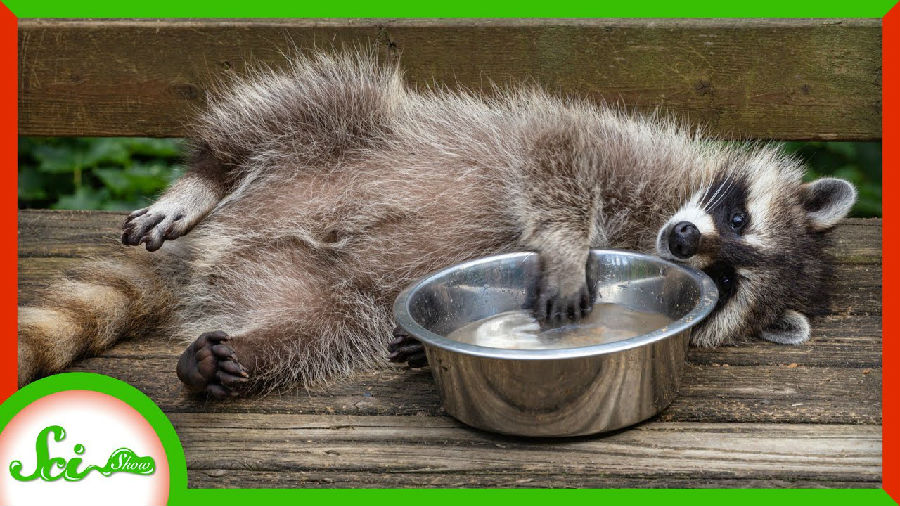Thanks to Brilliant for supporting this episode of SciShow. Go to Brilliant.org/SciShow to check out their course on number theory.
感谢Brilliant对本期节目的支持。登录Brilliant.org/SciShow了解他们的数字理论课程。
Raccoons are famous for their habit of dipping and shaking their food in water before eating it.
浣熊会在吃东西前把食物浸在水中并摇晃,它们也因此而出名。
This behavior is called dousing, and it looks a lot like they're washing their food.
这一行为被称为‘浣’,看起来很像是它们在清洗自己的食物一样。
For a long time, scientists thought that's exactly what it was but there's good reason to think that's not what they're up to.
很长一段时间以来,科学家们认为它们就是在清洗食物,但有充分理由认为并不是。
For one thing, they only do it in captivity. You might see a wild raccoon with its hands in the water,
首先,它们只会在被圈养的情况下这么做。你或许看见过一只野生浣熊将手放进水中,
but they're not washing food, they're looking for it.
但是它们不是在清洗食物,而是在寻找食物。
Raccoons' front paws are very dextrous and very sensitive, and they're the animal's main tools for foraging.
浣熊的前爪非常灵巧且敏感,这是它们觅食的主要工具。
On land or in water, raccoons use patting motions to feel around for treats,
不论在陆地还是在水中,浣熊用轻拍的动作四处寻找食物,
investigating whatever they find with their hands before putting it in their mouths.
在把食物塞进嘴巴之前,观察手中的食物。
But captive raccoons will actually carry food to water, dip it in and move it around, and then pick it up and eat it.
但是被圈养的浣熊真的会把食物浸入水中,四下摇晃,然后拿起来吃掉。
One of the most famous and often-referenced studies to explore this behavior
探究这一行为的最著名最常被引用的研究之一
is a series of experiments from 1963 that presented food to captive raccoons in various scenarios.
是一系列始于1963年的实验——在各种场景中,将食物提供给被圈养的浣熊。
Most notably, the raccoons were no more likely to douse muddy food than clean food. Which is a strike against them being neat freaks.
最值得注意的是,和干净的食物相比,浣熊并没有更愿意‘浣’泥泞的食物。这对它们洁癖怪胎的形象是一个打击。
There was also the hypothesis that they were moistening their food to help it go down easier.
还有假设认为它们浸湿自己的食物是为了帮助更容易下咽。
But raccoons had no preference for dousing dry food over the wet stuff.
但和湿乎乎的物品相比,浣熊并没有更喜欢‘浣’干燥食物。
One hypothesis still in the running today is that water makes those already sensitive paws super-powered.
今天仍在流行的一种假设是,水使那些本来就很敏感的爪子拥有了超强的动力。

The 1963 study partially tested this: based on evidence that warmer water increases sensitivity,
1963年的研究对此进行了部分测试:基于水温升高会增加敏感性的证据,
they ran trials with one raccoon to see if it had a preferred dousing temperature, which it didn't.
他们对一只浣熊进行了试验,看它是否有偏好的‘浣洗’温度,但它没有。
But more recent research has found that wetting a raccoon's hands makes the nerves in the skin much more sensitive.
更近期的研究发现,打湿浣熊的双手使得皮肤上的神经更加敏感。
So it might be that dousing helps raccoons get a better feel for their food.
所以或许是‘浣’帮助浣熊更好地感知食物。
But that 1963 study also supports a different explanation for dousing: that the raccoons just can't help it.
但是这项1963年的研究也支持一种对‘浣’的不同解释:浣熊就是情不自禁会这么做。
The experiments revealed that raccoons doused more when a water dish was easily accessible, when the dish had sand in the bottom,
实验表明,当更容易获得水碟的时候,当水碟底部有沙子时以及当食物是虾或贻贝等水生类时,
and if the food was something aquatic like a shrimp or mussels.
浣熊‘浣’的次数更多。
These patterns lead some scientists to suspect this behavior might be a fixed action pattern -- basically, an instinctual compulsion.
这些模式让一些科学家怀疑,这种行为可能是一种固定动作模式——是一种本能的冲动。
Captive raccoons don't need to search in water for food. It's just kind of handed to them.
圈养浣熊不需要在水中寻找食物。食物是通过手传递给它们的。
But if they find themselves holding aquatic prey and the nearby water dish has a sandy bottom like a stream,
但如果它们发现自己拿的是水生猎物,且附近的水碟中有沙底,像小溪一样,
their brains might just be hardwired to go through the motions of their wild foraging behavior, even though they don't have to.
它们的大脑可能本能地让它们作出野外觅食行为的样子,即便它们不必如此。
This might be similar to the way cats in captivity will bat food around to simulate the feeling of hunting prey.
这可能类似于被圈养的猫会四处扑食以模仿捕猎的感觉一样。
So raccoons may not be little food-washers, but they are talented and specialized foragers who
所以浣熊或许不是小型的食物清洗工,但它们是很有天赋又很专业的觅食者,
-- for one reason or another -- just can't help playing with their food.
由于某种原因,它们只是会亲不自禁的玩弄自己的食物。
If you want to play with something a little more sophisticated, you might be interested in the courses over on Brilliant.
如果你想玩一些更复杂的东西,你可能会对Brilliant上的课程感兴趣。
Like their course on number theory.
比如他们的数字理论课程。
It'll teach you everything you ever wanted to know about how numbers work -- from prime factors to infinity. So that's a lot!
该课程会教所有你想了解的关于数字的知识——比如质因子和无穷限大。
You can find this interactive course and many more in science, math, engineering, and computer science over on Brilliant.
你会发现这是一门交互式课程,Brilliant上还有关于科学、数学、工程和计算机科学的课程。
Right now, the first 200 people to sign up for an annual premium subscription at Brilliant.org/SciShow will get 20% off. So check it out if you're interested!
现在前两百名的观众将获得年度会员八折优惠。感兴趣的话,就去看看吧。


